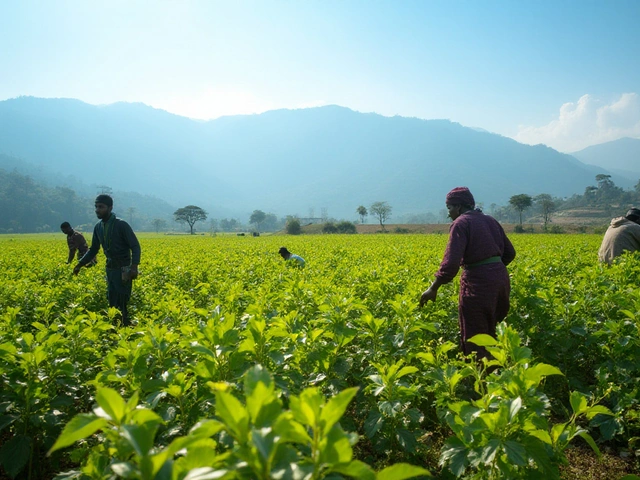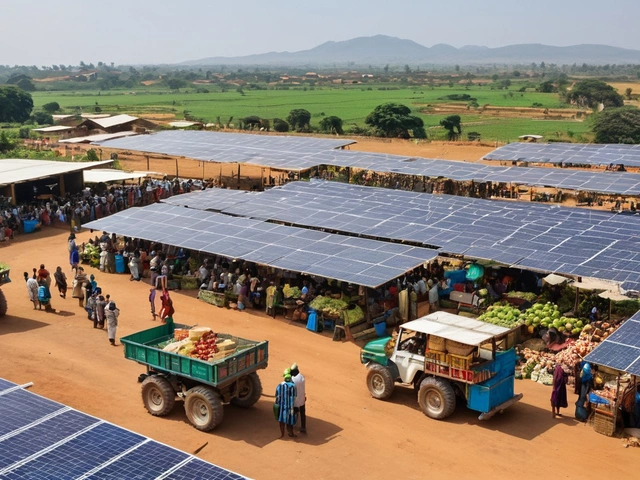Ethiopia, a country marked by rich traditions and an ambitious stride towards modernization, is fast becoming an investment hotspot. Recognized as Africa's second-most populous nation, it boasts a young and dynamic workforce eager to fuel its development.
Investing here isn’t merely about capitalizing on numbers; it's about stepping into a land where growth and opportunities are as vast as its diverse culture. Behind its growth are sectors like agriculture and manufacturing, each holding significant potential for profit and influence.
With government reforms actively encouraging foreign investment and offering various incentives, Ethiopia's doors are opening wider. Yet, like any investment venture, it comes with its own set of challenges and risks, demanding a careful, well-informed approach.
- Economic Growth and Stability
- Key Sectors for Investment
- Government Reforms and Incentives
- Challenges and Risks
- Success Stories and Future Prospects
Economic Growth and Stability
Ethiopia's economic growth over the past decade has been nothing short of remarkable. Averaging a growth rate of around 9% annually, the nation has consistently topped the charts among global emerging economies. This robust expansion has largely been driven by government-led infrastructure projects, which have spurred development in urban and rural settings alike. Despite being a landlocked country, Ethiopia's strategic position as a gateway to both the East African market and the Middle East lends it an attractive edge for potential investors focusing on regional trade opportunities.
The agricultural sector, representing about a third of the country's GDP, plays an essential role in this economic tapestry. From coffee beans that make their way to cafes worldwide to burgeoning flower exports, Ethiopia's agrarian roots are deep and diverse. This sector provides employment to nearly 70% of the population, underscoring its critical importance. Nevertheless, the economy is increasingly branching out into manufacturing and services, with the creation of industrial parks aimed at enhancing productivity and export capacity. Ethiopia investment opportunities in textiles and apparel have grown, leveraging low labor costs and preferential trade agreements with major markets like the United States and the European Union.
Recent economic reforms have further reinforced the country's stability, setting the stage for sustainable growth. Structural adjustments focusing on privatization and liberalization have been pivotal in attracting foreign direct investment. The National Bank of Ethiopia has played a role in stabilizing the birr amid inflation pressures, maintaining a market conducive to investor confidence. As a result, many multinational corporations are setting up operations or expanding existing ones in the region, driven by the potential to tap into both local and international markets.
The World Bank notes, "Ethiopia's ambitious reform agenda aims to create 2 million jobs annually, fostering an inclusive path to prosperity."
As Ethiopia redefines its economic landscape, challenges remain, including political risks and vulnerability to climate change. Encouragingly, the government's proactive stance on addressing these issues signals a balanced approach to maintaining economic growth. Investments in renewable energy sources, like the Grand Ethiopian Renaissance Dam, signify a commitment to not just harnessing natural resources but doing so responsibly. Such projects not only aim to boost power generation but also to create a ripple effect of advancements in industrial capacity and living standards.
Key Sectors for Investment
Delving into Ethiopia's investment landscape reveals a vibrant tapestry of opportunities across numerous sectors. Among these, agriculture stands out as a cornerstone of the economy. Accounting for nearly 34% of the country’s GDP and employing a large segment of the population, Ethiopia's flowering agricultural sector presents immense potential for investors. The nation is blessed with a variety of climatic zones, fertile soils, and logistically strategic locations for both export and local distribution. With crops like coffee, sesame, and teff gaining popularity worldwide, budding entrepreneurs and established companies alike find lucrative avenues to explore in this field.
The manufacturing industry is another thriving domain, drawing the attention of investors globally. The government has established several industrial parks designed to streamline operations and reduce overhead costs for foreign businesses. Textiles, apparel, and leather processing are manifold with possibilities due to the country’s abundant natural resources. The shift towards industrialization is supported by policies aiming to facilitate economic growth, providing long-term space for manufacturing enterprises to flourish. According to a study by the UN, Ethiopia’s manufacturing sector has the potential to create up to 2 million jobs in the coming decades.
Ethiopian economist Alemayehu Geda once stated, "The manufacturing sector represents not just an opportunity, but a transformative experience for the Ethiopian economy."
Service industries including tourism, financial services, and IT are not left behind. Ethiopia's rich cultural heritage, stunning landscapes, and archaeological sites are major tourist drawer, driving investments into hospitality and related services. The government's liberalization of the telecommunications sector is set to bring dynamic growth to IT and related fields, with the promise of advanced infrastructure and expanded digital networks. Emerging fintech solutions are poised to revolutionize the financial landscape by enhancing access to credit and funding for small to medium enterprises.
Ethiopia is also venturing towards renewable energy resources. With abundant sunshine and vast land areas, solar energy is a promising sector. Wind and hydropower projects are already underway, addressing the country’s need for sustainable and efficient energy sources. Joining this venture not only promises profitability but also supports the country's green initiatives and environmental commitments. The government offers incentives and tax reliefs for those investing in renewable energy, making it a highly attractive option for eco-conscious investors.
In summary, Ethiopia's economic canvas is broad and inviting, with key sectors offering plentiful investment opportunities. Nestled amidst ongoing reforms and dynamic economic growth, Ethiopia is a compelling destination for investors eager to tap into markets rich with potential and prospects.

Government Reforms and Incentives
When one considers investing in Ethiopia, the profound changes brought about by government reforms greatly enhance its appeal. Over the past few years, Ethiopia's government has been steadfast in transforming the economic landscape through clear and strategic initiatives aimed at fostering a favorable business climate. These reforms reflect the country's commitment to attract both domestic and foreign investors by streamlining processes and reducing bureaucratic hurdles. For instance, the government has simplified the registration process for businesses, significantly cutting down on paperwork and processing time. This move is pivotal given the historical complexities for enterprises getting off the ground in many emerging markets.
A particularly notable change has been the privatization of several key industries that were long dominated by state-owned enterprises. This shift has opened up sectors like telecommunications, which holds tremendous potential in a country undergoing a digital transformation. By allowing private companies to enter these markets, there is increased competition, which in turn leads to better services and innovation. Additionally, the establishment of industrial parks has also been a game changer. These parks serve as hubs for manufacturing, enabling businesses to benefit from shared resources and infrastructure, cutting down costs significantly.
The Ethiopian government also offers a slew of incentives that make investing an enticing prospect. Tax holidays, customs duty reductions, and access to new markets through bilateral and multilateral agreements are among the perks designed to attract investors. The government has enacted policies to ensure that regions outside Addis Ababa, the bustling capital, also benefit from development. Key regional cities are targeted by these reforms, thus broadening the scope for investing across the nation. A quote from Abiy Ahmed, the Prime Minister of Ethiopia, highlights the country's vision:
"Our reforms are designed to unlock the potential of the Ethiopian market and to ensure that all investors, big or small, find a home for their entrepreneurial spirits."In such a scenario, where the government's vision matches action, it is no surprise that Ethiopia's economy is one of the fastest-growing worldwide.
Beyond the immediate financial incentives, the reforms emphasize sustainable development, incorporating green energy solutions and environmentally friendly practices. This aspect not only aligns with global trends towards sustainability but also opens opportunities in new sectors. For international investors, this indicates a future-forward approach by the Ethiopian government, ensuring that investments today won’t become liabilities tomorrow. Statistics showing growth trends and projections could further illuminate the vast potential of these reforms:
| Year | GDP Growth Rate | FDI Inflow (in billions USD) |
|---|---|---|
| 2020 | 6.1% | 3.2 |
| 2021 | 6.3% | 3.5 |
| 2022 | 6.6% | 4.0 |
As one navigates the myriad opportunities presented by Ethiopia’s proactive stance on attracting investment, it becomes clear that the country's strategic efforts are setting a strong foundation for sustainable and inclusive economic growth. This makes it a promising destination for those seeking to capitalize on emerging market opportunities while contributing to the nation's transformative journey.
Challenges and Risks
Entering the vibrant yet uncharted territory of Ethiopia investment requires a robust understanding of the potential hurdles one might encounter. This dynamic environment, though replete with opportunities, poses certain risks that investors should not ignore. One major challenge is the country's changing regulatory landscape. While the government is keen on welcoming foreign capital, the regulatory conditions can often be a labyrinth to navigate. As policies evolve, keeping up with these changes becomes crucial for businesses to operate smoothly without sudden disruptions.
Another pressing concern is infrastructure. Although Ethiopia has made significant strides in improving its infrastructure, certain areas still lag behind. Investors may find logistics and transportation to be less than optimal in some regions, which can impact supply chains and project timelines. Inadequate infrastructure affects efficiency, thereby posing a risk to profitability in industries like manufacturing where timely delivery of goods is paramount.
The fluctuating currency is another factor to consider. The Ethiopian birr has seen its share of volatility, which can lead to uncertain financial projections for international investors. Exchange rate risks are particularly daunting for companies that operate with thin margins. Managing these risks requires a strategic approach, often involving hedging and other financial instruments.
Political factors also play a significant role. While Ethiopia is experiencing a period of relative stability, it is important to remember that political dynamics can shift rapidly. Investors should be aware of the broader geopolitical landscape in the region, including relations with neighboring countries and internal political developments. These factors can influence the business climate unexpectedly.
"Investment in Ethiopia is not without its hurdles, yet with keen awareness and adept navigation, the rewards can be significant," says a leading economist focused on the African region.
An additional layer of complexity is added by cultural and language barriers. Establishing operations in a new country often requires an understanding of local customs and business practices. Without this, companies might face challenges in workforce management and negotiations with local partners. These cultural differences can affect everything from marketing strategies to daily operations.
| Challenge | Impact |
|---|---|
| Regulatory changes | Need for constant adaptation |
| Infrastructure gaps | Supply chain disruptions |
| Currency volatility | Uncertain financial projections |
| Political landscape | Potential shifts in business climate |
Thus, while Ethiopia boasts immense potential, it is clear that investing here requires a careful, informed approach. By understanding and preparing for these challenges, investors can better position themselves to capture the rewards this promising country has to offer.

Success Stories and Future Prospects
When it comes to Ethiopia investment, several success stories serve as a beacon of encouragement for those considering diving into its burgeoning markets. Take, for instance, the transformation of Ethiopia’s textile industry. A decade ago, the sector was struggling to gain a foothold, but with strategic investments from European and Chinese companies, it has become one of the largest earners of foreign exchange for the country. Factories like the Hawassa Industrial Park now export garments to top fashion brands worldwide. This transformation did not occur overnight; it was driven by governmental policies that favored open markets and tax incentives, which were instrumental in attracting foreign businesses.
The tech scene in Ethiopia also presents impressive tales of growth and success. Consider the story of Gebeya Inc., an Ethiopian startup founded to bridge the gap between Africa’s tech talent and the growing demand for software solutions. Gebeya has trained thousands of local developers, many of whom have gone on to work with international tech firms. Such achievements show the untapped potential in Ethiopia’s youth-driven tech industry. With an internet penetration rate still in its infancy, the room for growth is immense. It's a space ripe for investors looking to make an impactful entry into the tech world.
Another compelling success narrative revolves around the growing agriculture sector in Ethiopia. The country is known for its coffee—a staple loved globally—but beyond this legendary bean, Ethiopia’s fertile lands produce a bounty of crops ripe for export. Agribusinesses that have invested in Ethiopia speak highly of the quality of produce and the competitive advantage presented by lower labor costs.
"Ethiopia’s unique climate and soil conditions are ideal for horticulture,” shared a representative from a European agribusiness giant.Such testimonials underscore the country's strength as a hub for quality agricultural products.
Looking ahead, Ethiopia's future as an investment hub seems promising. The government continues to implement reforms aimed at easing business operations. Initiatives such as the Ethiopian Investment Commission’s “Ease of Doing Business” project are gradually altering perceptions and boosting investor confidence. These steps towards creating a more investor-friendly atmosphere are crucial for Ethiopia to maintain its growth trajectory. Encouragingly, sectors like renewable energy hold great promise. The nation's ambitious plan to become a carbon-neutral economy by the next decade highlights immense possibilities for business opportunities in this emerging green sector.
In summary, while Ethiopia presents an intriguing landscape for investment, its success stories and future prospects depend on its ability to continue adapting and attracting diverse streams of investment. These stories show how resilience, when coupled with strategic planning, can lead to substantial rewards. For those with a keen eye for innovation and growth in developing markets, Ethiopia's story is one worth being a part of.

 Exploring the Rising Costs of Food in Ethiopia: Factors and Solutions
Exploring the Rising Costs of Food in Ethiopia: Factors and Solutions
 Understanding the Minimum Salary in Ethiopia: Key Facts and Insights
Understanding the Minimum Salary in Ethiopia: Key Facts and Insights
 Understanding the Average Household Income in Ethiopia
Understanding the Average Household Income in Ethiopia
 Most Common Jobs in Ethiopia Revealed
Most Common Jobs in Ethiopia Revealed
 Top Profitable Businesses in Africa: Revealing the Best Money-Makers
Top Profitable Businesses in Africa: Revealing the Best Money-Makers
Kim Chase
October 26, 2024 AT 17:34Hey folks, just wanted to throw a friendly heads‑up that Ethiopia’s youthful labor pool can be a real game‑changer for anyone looking to scale up production quickly. The government’s new tax holidays are pretty generous, especially if you’re eyeing the agro‑processing space. Keep an eye on the industrial parks around Hawassa – they’ve got decent infrastructure and some built‑in logistics support. Also, don’t forget to respect the local customs; a little cultural awareness goes a long way in building trust. Happy investing!
David Werner
November 3, 2024 AT 20:00Listen up, the so‑called “reforms” are just a veil to let big powers siphon off Ethiopia’s resources while the locals stay in the shadows. Every new incentive comes with hidden clauses that can turn your capital into a hostage overnight. The whole setup feels like a stage‑play designed for the elite, and anyone naïve enough to walk in will end up a pawn.
Paul KEIL
November 11, 2024 AT 23:26Leverage synergies within the emerging value‑chain to optimize ROI via vertical integration despite regulatory latency. Disruptive scaling mandates agile governance frameworks.
Horace Wormely
November 20, 2024 AT 02:52The Ethiopian birr's recent volatility underscores the necessity for robust hedging strategies when foreign investors allocate capital.
christine mae cotejo
November 28, 2024 AT 06:17When you step onto the Ethiopian investment stage, you immediately sense a palpable kinetic energy that courses through both the agrarian fields and the humming factories of the industrial parks. The nation’s demographic dividend – a populace where over 60% are under the age of 25 – fuels a labor market that is both eager and adaptable, offering a reservoir of human capital that can be upskilled to meet global standards. Moreover, the government’s commitment to liberalizing key sectors, such as telecommunications and renewable energy, has birthed a policy environment that, while still evolving, signals a willingness to align with international best practices. Investors can capitalize on the fertile coffee belt, where premium Arabica beans command premium prices on the world market, while simultaneously diversifying into high‑value horticulture that benefits from Ethiopia’s varied microclimates. The textile and apparel clusters, particularly those anchored in the Hawassa and Mekelle industrial zones, have already demonstrated the capacity to produce export‑ready garments that compete on cost and quality. Renewable energy projects, especially solar farms in the arid lowlands, not only offer attractive returns under feed‑in tariffs but also dovetail with the country’s ambitious carbon‑neutral roadmap. However, no venture is without its shadows; the regulatory framework, though improving, still presents a labyrinth of permits that can delay timelines if not navigated with local expertise. Infrastructure bottlenecks, such as intermittent power supply outside major urban centers, remain a logistical hurdle that necessitates strategic contingency planning. Currency fluctuations of the birr, while partially mitigated by forward contracts, can still erode profit margins if exposure is not carefully hedged. Political stability, ever a variable in the Horn of Africa, requires continuous monitoring, though recent reforms have fostered a more predictable investment climate. Cultural nuances, from business etiquette to language dialects, demand a respectful approach that values partnership over paternalism. In essence, the Ethiopian market offers a rare blend of high growth potential and tangible risks, a combination that rewards diligent, long‑term stakeholders. By weaving together robust risk‑management frameworks with a genuine commitment to local development, investors can not only secure profitable returns but also contribute to a transformative narrative for the nation. Ultimately, the decision to invest in Ethiopia should be anchored in thorough due diligence, strategic foresight, and an appreciation for the country’s unique tapestry of opportunities and challenges.
William Anderson
December 6, 2024 AT 09:43Honestly, the hype around Ethiopia’s industrial parks feels overblown; the promised infrastructure often resembles half‑finished construction sites, and the bureaucratic drag can sap any enthusiasm. While the tax holidays sound sweet on paper, they rarely translate into tangible savings once hidden fees surface. The labor cost advantage is real, but the skill gap means you’ll spend more on training than you anticipated. In short, proceed with caution, or you might end up with a costly lesson.
Sherri Gassaway
December 14, 2024 AT 13:09Contemplating Ethiopia’s growth, one perceives a dialectic between tradition and modernity, where ancient agricultural practices intersect with emerging digital frameworks, forging a unique socioeconomic tapestry. This juxtaposition invites investors to reflect on the deeper implications of capital infusion beyond mere profit metrics.
Milo Cado
December 22, 2024 AT 16:34It’s truly inspiring to witness Ethiopia’s momentum, and for those considering a foothold, the blend of youthful talent, strategic reforms, and expanding market access creates a promising canvas for sustainable ventures. I encourage you to explore the agribusiness and renewable energy sectors, where impact and returns can go hand‑in‑hand 😊. Stay informed, engage local partners, and let optimism guide your strategic roadmap 🌍.